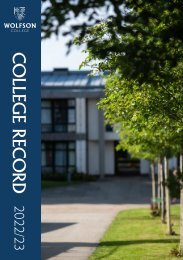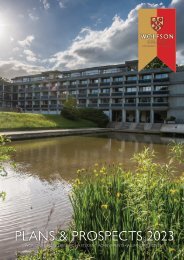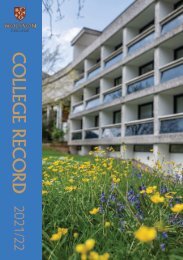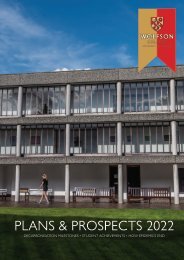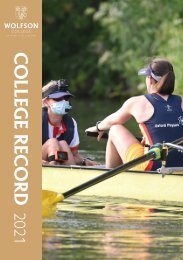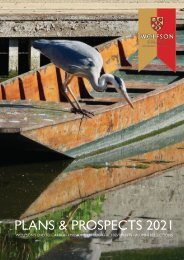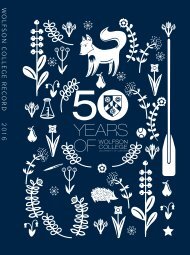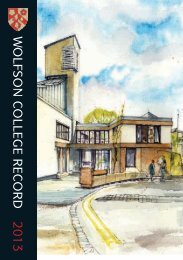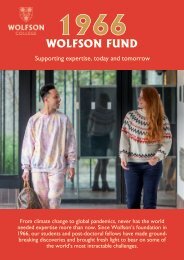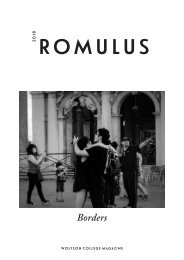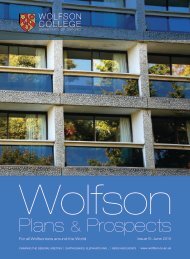You also want an ePaper? Increase the reach of your titles
YUMPU automatically turns print PDFs into web optimized ePapers that Google loves.
MEMORIES OF WOLFSON<br />
106<br />
Hans and Willy<br />
Schenk: two<br />
refugees from<br />
Prague in<br />
war-time Britain<br />
by Christopher Schenk<br />
(GS 1972–75)<br />
Hans Schenk, one of the original Iffley<br />
Fellows of Wolfson, arrived in Harwich on<br />
17 March 1939 as an asylum-seeker, with<br />
his younger brother Willy. Both of them had<br />
Czechoslovakian nationality but they were<br />
not Czechs, nor were they Slovaks.<br />
The photograph (on p. 109) of Hans aged<br />
ten and Willy aged four, with their mother,<br />
Ilse, and their nanny, Lissy, reveals their true<br />
ethnicity. They were born subjects of the<br />
Austro-Hungarian monarch: Hans on 6<br />
April 1912, when the Emperor Franz Joseph<br />
was in the 64th year of his reign, and Willy<br />
on 26 July 1918, during the short reign of<br />
the Emperor Charles, the last monarch of<br />
Austria-Hungary. Before the war they were<br />
part of the German-speaking minority in<br />
Prague. It was a substantial minority and<br />
Prague was a bilingual city with parallel<br />
Czech and German institutions,<br />
including universities.<br />
Ferdinand, Hans and Willy’s father, was a<br />
Professor of Gynaecology and Obstetrics<br />
in the German University in Prague. He<br />
was born into a Jewish family but became<br />
a Roman Catholic in order to marry Ilse in<br />
Vienna in 1911. She was a good linguist and<br />
spoke fluent Italian, and good English and<br />
French.<br />
In pre-war Prague, Hans made a name<br />
for himself as a strong chess player. In the<br />
1970s he wrote an article for Lycidas called<br />
‘Chess Reminiscences’, which recalls that<br />
in 1929, when he was 17, he was one of<br />
thirty players taken on in Prague by Aron<br />
Nimzovitch in a simultaneous exhibition.<br />
‘I happened to be the last player left after<br />
the other 29 games had been finished’, he<br />
writes, ‘so Nimzovitch sat down to play the<br />
end game against me. Although I had a<br />
slight disadvantage, I managed to hang on<br />
for a draw.’ He went on to even greater<br />
things in the 1930s when he defeated<br />
José Capablanca, in another simultaneous<br />
exhibition.<br />
In 1935, Hans was awarded a doctorate in<br />
law and was appointed as an assistant at the<br />
Institute of Political Science at the German<br />
University. He worked closely with Professor<br />
Hans Kelsen, an eminent legal and political<br />
philosopher, who was an outspoken critic<br />
of the Nazis. During Kelsen’s short time in<br />
Prague, from October 1936 to February<br />
1938, he had many difficulties with Nazisupporting<br />
students. In a testimonial written<br />
in 1947, when Kelsen was Professor of<br />
Political Science at Berkeley, he says of Hans:<br />
‘In my conflict with the Nazi students in<br />
Prague, he firmly and courageously stood on<br />
my side, in spite of all disadvantages he had<br />
to endure as a consequence of his attitude.’<br />
The first disadvantage was that his university<br />
post was not renewed at the end of 1937,<br />
so in January 1938 he started working<br />
COLLEGE RECORD <strong>2019</strong><br />
Photo: Christopher Schenk



